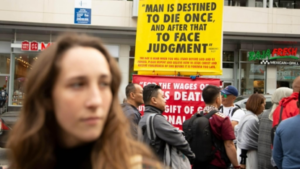Dear Editor,
What are human rights? According to the Office of the High Commissioner of Human Rights, “Human rights are rights inherent to all human beings, whatever our nationality, place of residence, sex, national or ethnic origin, colour, religion, language, or any other status”. Who has the privilege of defining and conferring the rights which are “inherent to all human beings”? Can “human rights” be defined in the absence of a definition of the human nature?
Many scholars, regard the work of John Locke in his Two Treatises of Government (1680-1690) as being seminal in the development of human rights. Locke saw the natural freedom of men as being bound by the law of nature. According to Michael Freeman in his essay, “The Problem of Secularism in Human Rights Theory”
“We should note carefully the logic of this important moment in the history of the Western theory of human rights. The argument begins, not with rights, but with the obligation of everyone to obey the law of nature. This obligation is not to harm the life, health, liberty, or possessions of others. The ground of this obligation is that all men are the “workmanship” of God, his servants, and his property… This obligation not to harm others, Locke assumed, entailed the right of everyone not to be harmed. Locke introduced the concept of rights almost casually in a discussion of God’s purpose in creating mankind and the consequent obligations of men to God and to each other.”
Locke’s thinking influenced the 1776 United States Declaration of Independence which refers to the law of Nature and of Nature’s God.
Contemporary concern for “human rights” was as a direct result of the atrocities committed in World War II. The result was the encoding of these concerns in the 1948 Universal Declaration of Human Rights (UDHR).
However we seem to be now at a place where duty and obligations which are bound-up in the concept of the natural law are no longer balancing elements. Instead the concepts of liberty and ‘rights’ are seen as an ever-expanding tree with very little in the way of limitations resulting in the embrace of illogical and irrational behaviour. Having cast aside the balancing concepts, many of the Western societies have left themselves without the tools necessary to critique behaviour. Instead, these concepts have now been reinterpreted to support radical autonomy. It’s no wonder that Melanie Phillips inher book, Londonistan,makes the point that, “Human rights doctrine is the principal cultural weapon to undermine the fundamental values of Western society.”
The question which is always worthy of consideration is how does one balance rights of an individual with the duties and obligations owed to a society? In the past it was thought that one of the primary duties of human society was the defence of human life. Thus there was a philosophy that laws were to be passed in the interest of the “common good” meaning that good which is common to all. That concept was seen as the overarching and thus the balancing concept. The question which is implicit in the concept of the common good is- what laws and policies best promote human flourishing? Sadly many scholars no longer operate on that basis. Instead what now prevails is the premise that each person is his own “ultimate evaluative authority’. Each person is his own “god”. In this framework ‘rights” are seen as an end to themselves ‘with freedom to do what is convenient” to use the words of late Professor Ralph Carnegie, being given high premium. As a part of this “freedom to do what is convenient’ is the unspoken but very real “right to destroy”. It allows individuals the right to destroy unborn babies, engage in risky sexual pleasures, destroy one’s own life and to destroy the concepts of marriage and family. Not to mention the penalties for those who refuse to bow to these new rights! Currently we in Jamaica have a Charter of Rights as a part of our Constitution which thankfully does include some checks and balances on the right to destroy. But we have to guard this jealously especially in view of the planned constitutional reform.
Any system of human rights which does not have a realistic view of human nature is bound to be problematic. That is what has happened in England. Beginning in the 1950’s, England began a journey of liberalization of certain laws against including laws relating to buggery and abortion.
This is what Jonathan Sacks former Chief Rabbi of England said in his book entitled “Morality” about what he referred to as “the liberalizing measures” and I quote:
“What emerged from the liberalizing measures of the 1960’s was something that has never been managed successfully before, namely, sustaining a society not held together by certain predominant ideas, not bound by a shared moral code, not committed to substantive ethical “ideas held in common.”
No society has ever survived this for very long, not ancient Greece, Rome of antiquity nor Renaissance Italy. In each of these three cases, the release from traditional moral constraints for a while unleashed a burst of energy and creativity but was too quickly followed by decline and fall. A society of individualists is unsustainable”
Jamaica would do well to learn from the experience of Britain and other countries in this matter.
I am
Shirley Richards
sprichards82@yahoo.com






